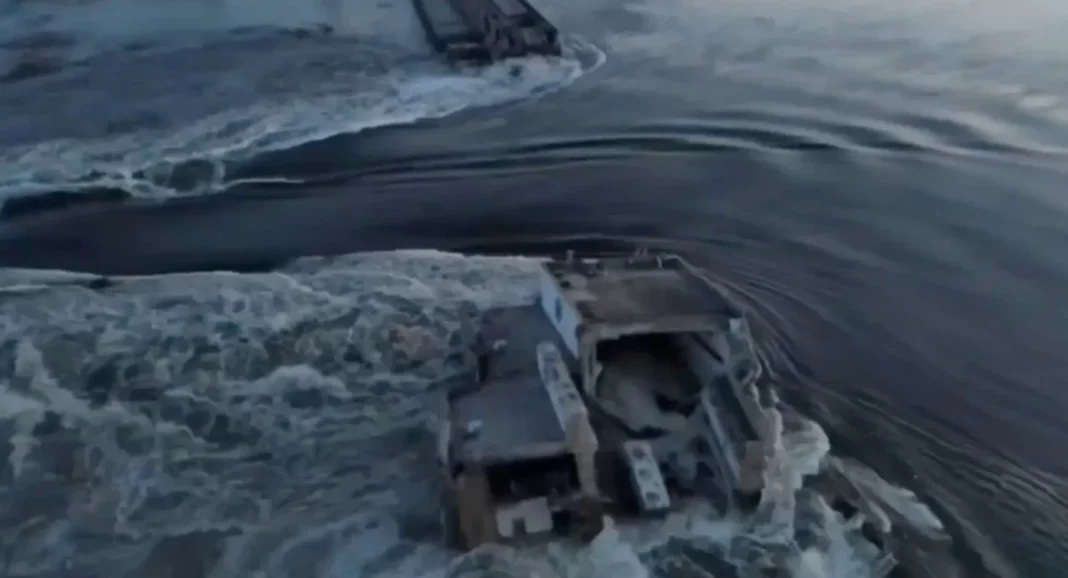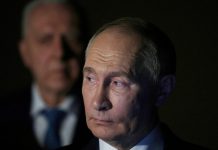By Francis Harris, for CEPA
Russia is once again the prime suspect as it denies responsibility for the Kakhovka Dam catastrophe.
First, the facts — The Kakhovka Dam, behind which lies a huge reservoir of 18bn cubic kilometers of water, was breached on June 6. This has resulted in an environmental and human calamity that is grave even by the standards of Russia’s 15-month-old war in Ukraine.
What happened? Reports suggested a huge series of explosions broke the dam and freed an enormous weight of water to move down the Dnipro River. Large areas of Southern Ukraine are now flooding. Nova Kakhovka, near the dam, is under 11 meters (36ft) of water. As many as 80 towns and villages are being evacuated as far as Kherson, more than 50 miles away. As many as 17,000 people are being evacuated. Tracts of inhabited land are becoming swamps.
The International Atomic Energy Authority (IAEA) said the Zaporizhzhia nuclear plant which is upriver of the breach, should not be affected.
Who controls the dam? Russia. But it denies that the facility was blown by its engineers and said the area had been under Ukrainian shell fire since last year. There have been a series of attacks on dams throughout the conflict, in particular Ukraine’s 2022 destruction of the Irpin dam that helped its defense of Kyiv. But most attacks on dams have been Russian as part of its campaign against power facilities.
Who did it? Both sides are capable of destroying the dam, but Russia would benefit more.
Indeed, it’s hard to see what Ukraine would gain. It has long warned that Russia had mined the facility and took responsibility for destroying infrastructure in the past (see Irpin, above.) The land affected is Ukrainian and so are the people. The long-term costs will be considerable.
Most compellingly, such an operation behind enemy lines would be difficult, highly risky, and utterly counter-productive.
On June 4, many observers of the conflict announced that Ukraine had begun its long-expected offensive against the Russian invader. The Kakhovka Dam’s destruction came less than 48 hours later.
In one sense, the question misses a broader point. As Germany’s Foreign Minister Annalena Baerbock said: “There is only one thing responsible for this environmental catastrophe: Russia’s criminal war of aggression on Ukraine.”
What does the breach signify in military terms? By widening the River Dnipro below the dam, the Russians would make an already significant water obstacle much more formidable. The dam also had a road running across the top that may have been useable by the military. Russian commanders may always have intended to blow the dam once the Ukrainian offensive began, in order to strengthen their flank. And they may have been worrying for some reason — Ukrainian military statements have taunted Russia with small-scale crossings of the river, and it’s also the case that some Western-supplied equipment is amphibious, including armored and bridge-laying vehicles. The Economist reported that Western military sources believed Russia was almost certainly responsible.
Russian commanders may hope that with the eastern bank of the Dnipro secured, Ukraine’s shortest route to Crimea will be blocked, forcing it to send its assault forces into better-prepared defenses to the southeast of Zaporizhzhia. If so, this very considerably reduces the area of front Russia’s generals will need to defend.
Are there other reasons to suspect Russia? There are multiple reasons to suspect Russia.
But Russia has denied involvement. That’s the point. The credibility of Russian denials has been tested time and again.
Among its standout denials:
- Russia denied from late 2021 that it planned a full-scale invasion of Ukraine and mocked those suggesting it would do so. It launched a full-scale invasion of Ukraine on February 24, 2022.
- Russia denied it sabotaged the Nord Stream gas pipelines in September. Evidence since then shows that Russian naval vessels were in the area shortly before the blasts and that it may have thus avoided a $39.5bn bill for shutting off contracted supplies in the months before.
- Russia denied an FSB agent murdered a Chechen opponent in Berlin in 2019. A German court said it was in fact guilty of the assassination
- Russia denied its military intelligence agents launched a chemical weapons attack in Salisbury, Southern England, to kill a renegade Russian agent and his daughter in 2018. A discarded bottle of Russian military nerve agent called Novichok subsequently killed an Englishwomen. Three Russian intelligence agents have been charged by police but remain at large.
- Russia denied two of the alleged Salisbury assassins were also behind the sabotage of a Czech arms dump in 2014, which killed two Czech nationals. The Czech authorities expelled scores of Russian intelligence agents from its Prague embassy in retaliation in 2021.
- Russia denied it shot down Malaysian Airlines Flight MH-17 over Eastern Ukraine in 2014, killing all 298 people on board. A Dutch court found three Russian-linked men guilty and said Russia controlled the forces they were a part of.
In short, it is always possible that Russian denials are true. It’s more likely though that the Kremlin’s extensive record of dishonesty is being extended once again before the world’s eyes.
By Francis Harris, for CEPA
Francis Harris is Managing Editor at the Center for European Policy Analysis (CEPA). He was previously a foreign correspondent in Prague, London, New York, and Washington.





